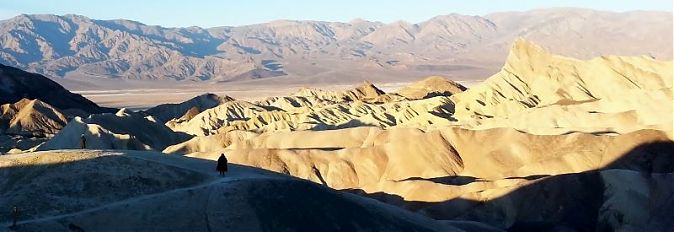|
February 23, 2015 CC BY 4.0 |
print comment |
Keywords: biography | experience | lsd | transgression

Zabriskie Point in Death Valley, © Heather Dundas
Until March 19, 2015, when our conference "Historicizing Foucault" begins in Zurich, we will consecutively publish the abstracts of the accepted presentations. Heather Dundas, a PhD candidate in Literature and Creative Writing at the University of Southern California, will talk about "Michel Foucault's Death Valley Trip" in the panel Counter Cultures on March 20, 2015.
During a 1975 visit to the United States, Michel Foucault was persuaded to take a road trip to a remote desert region on the eastern border of California. When Foucault's party reached Zabriskie Point in Death Valley, his host, an assistant professor at Claremont Graduate School, produced several tablets of LSD and proposed another trip—a psychedelic one. Foucault accepted this proposal, and later called this night "the greatest experience of his life." This presentation discusses the sex, drugs and rock-n-roll of Foucault's desert "trip," and examines the implications of his Death Valley epiphany.
The incident at Zabriskie Point brought together Foucault's ideas of the Nietzschean limit-experience with his longstanding inquiry into the role of the self in society. Multiple interviews with Dr. Simeon Wade, the host and lone surviving member of the expedition, as well as analysis of documents and photographs from Claremont Graduate School and Dr. Wade's personal archives, contextualize the time and the forces that led to this night in the desert. Furthermore, I argue that a consideration of this night indicates cultural phenomena influencing Foucault's later works, in which the discussion of power and knowledge is augmented with ideas about the care of the self.
François Cusset attributes the rise of French theory in American universities in the 1970s and 1980s to a "creative misunderstanding between French texts and American readers." [1] This presentation proposes a similar misunderstanding between American texts and French readers, and suggests that a French conception of the American west—with perhaps misread cowboy values—was an essential element in Foucault's push to revelation within the dark, strange landscape of Zabriskie Point. Ultimately, I contend that Foucault's paradigmatic shift in thinking can be interpreted as a response to the myth of America Deserta.
[1] Cusset, Francois. French Theory: How Foucault, Derrida, Deleuze, & Co. Transformed the Intellectual Life of the United States. Trans. Jeff Fort. Minneapolis: University of Minnesota Press, 2008.



Comment by Ivo Gurschler
Hello! I'd have a question for Heather Dundas but can't find a working email-address: could you probably be so kind and forward the following message to her?
—-
Dear Heather Dundas,
I am writing a PhD-thesis "On the Genealogy of Mescaline", and Foucault is an important reference … At the moment I am preparing a lecture for some workshop and quote Foucault saying that he doesn't have any explanation for the common analogy of psychotic mental states and certain drug experiences. I want to state that Foucault knew what he was talking about. Paul Veyne says in his Foucault-book that he was as a teenager experimenting with drugs, not least because they were readily available at home (since his father was a surgeon). Also it is mentioned that he did LSD quite regularly at the end of his lecture series in Berkeley. To make my case stronger it would be nice to mention the Death-Valley-trip, which he himself called "the greatest experience of his life", as you quoted in your talk at the ETH. Did you get a chance to publish this paper in the meantime? Or could you please name me the source of this statement?
Are you still working on your PhD? I can't find you on the list of students you have a link to on you page!?
Best wishes from Vienna,
Ivo